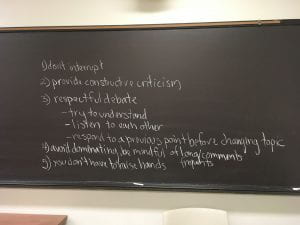Hello, everyone,
This (long) post is intended for HUMA Core faculty, Writing Interns, and Writing Specialists, on the assumption that the rapid move to remote teaching is likely to put pressure on well-understood work practices, and working relationships. The best practices below are offered for the special case of remote instruction, and are not intended to supersede other best practices, for instance, concerning written feedback on papers, set out in the Handbook. They are guidelines, offered to provide not only a basis for some stability, but also space for flexibility, consideration, and care for the well-being of all. (Special thanks t0 Valerie Levan.)
Best Practices for Writing Interns/Writing Specialists:
- Continue to teach writing and revision techniques to provide students with skills useful for writing that must accomplish several different functions. Design writing instruction to meet the goals for writing identified by the Instructor.
- To the extent possible, continue to work with students in some way that will allow communication between readers and writers, even if only in writing. Writing Interns may offer individual tutorials, or two-person peer critique tutorials. If remote meetings are not possible for students, the Intern may meet by other means, for instance, by audio only, by phone, in chat, or in writing.
- Discuss with the Instructor which digital platforms will be used, complete training as necessary, and review ITS guides for platforms new to you.
- Discuss with the Instructor to what extent to be flexible about deadlines, and what options are permitted.
- Inform the Instructor as soon as possible of technological difficulties that interfere with planned contacts with students.
- Provide students with adequate notice of upcoming discussion posts, peer-to-peer conferences or critique assignments, tutorials, and other required work.
- Provide clear and detailed instructions to students about how to participate in scheduled events: when to turn in assignments, what platform to turn to if the preferred platform fails; how to notify the Intern if an assignment will be late because no internet access is available. Provide students with alternate methods of contact: for example, “If Platform A fails, turn to Platform B, or call a phone number.”
- If circumstances prevent the student from meeting digitally, communicate in writing: follow up with the student, and arrange for an alternative the student or students can complete in writing. You might, for instance, give the students directions for analyzing a draft or doing an exercise, then provide feedback, and use chat or e-mail to answer questions. You might assign students to post to a discussion board, and assign pairs to comment on each other’s work.
Best practices for Instructors:
- Collaborate with the Writing Intern to choose the plan for writing instruction best suited to the course curriculum. Consider what modifications to allow if students do not have or lose access to broadband, computers, or phone data.
- Provide the Intern with a phone number where you can be reached if the Intern loses access to broadband, a computer, or phone data.
- Ask the Writing Intern to design writing instruction with their expected average hours per week in mind, and check with them to reconsider the plan for writing instruction if, for instance, more time than expected is required to use new technology, or be in contact with students who do not have access to technology. It is suggested that to manage their time, Writing Interns should prioritize following students’ written participation in the course, such as reading responses and Canvas discussion posts.


